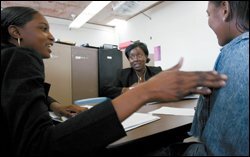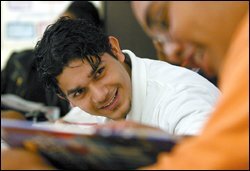When word spread at a suburban Dallas high school about plans to launch an ambitious mentoring program for this year’s seniors, some teachers believed they knew what to expect.
“Oh my God, more work!” one teacher recalls saying at the time.

But since its creation last fall, both teachers and students at Lancaster Elsie Robertson High School have come to believe in the program, which is designed to encourage students to stay in school, complete the academic work necessary to graduate, and move on to college.
Unlike many endeavors to provide youths with adult guidance and mentoring, the program at Lancaster High, just southeast of Dallas, targets every single student in the senior class—more than 300 in all—for help. The program also takes the unusual step of requiring nearly all school employees—not just teachers, but also administrators, instructional aides, and secretaries—to provide counseling to students.
“It’s mentoring from the inside out,” said Verdie Sadberry, an assistant principal at Lancaster High, who designed the program. The venture is built on the idea that if staff members “don’t care about the students, and the relationship with them, it won’t work,” she explained. “Students won’t buy into what you’re doing.”
An estimated 5,000 youth-mentoring programs are operating nationwide, sponsored by government agencies, school districts, nonprofit groups, and increasingly, faith-based organizations, according to the National Mentoring Center, a Portland, Ore., group that helps those efforts.
In targeting an entire class of students, and using a wide variety of school workers, the Texas program is unusual, said Patti MacRae, a training and technical-assistance specialist at the center. Her organization is part of the Northwest Regional 91��Ƭ����Ƶ Laboratory, a federally financed research center.
Mentors at Lancaster High track students’ attendance and academic progress, as well as their scores on the statewide tests, the Texas Assessment of Knowledge and Skills, that students must pass to graduate. The TAKS requirement has been a stumbling block for Lancaster High students in recent years, school officials say. Results from the mentoring program have been so successful, they say, that in recent weeks they have taken steps to expand it to all grades at the high school.
Deadlines and Forms
Ms. Sadberry said she had no formal blueprint for the program. At the beginning of the school year, Lancaster High employees were given a list of students with whom they are expected to meet at least once every six weeks, though many meet far more often than that, she said.
Mentors press students to take college-entrance exams and to fill out college applications and financial-aid forms. They keep track of the seniors’ TAKS scores and remind them to attend school-run tutoring sessions to improve those marks. Some mentor meetings are relatively formal, arranged in advance. Others are impromptu, such as when mentors pull students out of class, talk to them in the hallway, or call them at home.
Staff members must serve as mentors, though some employees, such as custodians, instead help organize students’ fulfillment of the school’s community-service requirements, Ms. Sadberry said. Each employee works with 10 to 15 students, said the assistant principal, herself a mentor.
She believes school employees, rather than adults from the community, serve as the most effective mentors, because they have access to academic records and can consult with teachers about students’ work.

“People from the outside don’t get that,” Ms. Sadberry said.
Ms. Sadberry began crafting the mentoring program at the end of the 2004-05 academic year, a disappointing time for many administrators in the Lancaster Independent School District, she and others said. Several students with academic records that should have qualified them for college did not pass parts of the TAKS or failed to graduate for other reasons, Superintendent Larry D. Lewis said.
“It kills you at graduation to see those kids sitting out there in the audience,” he said. “We said this will never, ever happen again.”
Lancaster’s school district serves a predominantly African-American student body, from a broad range of economic backgrounds, school officials say. Some come from single-parent homes; others from families where both parents work. If the parents haven’t attended college, they may not be familiar with the application and financial-aid process, Mr. Lewis said. Ultimately, he believes, the mentoring benefits them all.
The district has also launched a broader, districtwide effort to raise academic standards, Mr. Lewis said. As part of that undertaking, the K-12 district suspended more than 700 of its 5,800 students at the beginning of both semesters this school year for failing to complete assigned academic projects over their summer and winter breaks. Many parents complained, but the district has not budged, Mr. Lewis said.
The mentoring component is working, in the superintendent’s opinion. So far this academic year, he estimates, 80 percent of the high school’s seniors have passed all the necessary TAKS tests; only about 60 percent of last year’s class had done so by this time in the school year.
Ms. MacRae, of the National Mentoring Center, believes high school programs such as Lancaster’s tend to be most beneficial when they retain a relatively specific focus, such as improved academics, as opposed to offering teenagers overly broad guidance.
“It’s not helpful to just tell seniors that they’re going to have one more friend,” she said. The response from those students, noted Ms. MacRae, might be “‘Why do I need another friend?’ ”
One of Lancaster High’s newly anointed mentors is Helena Besses, a secretary in the counselor’s office, who is now in her 10th year at the school. She said that although most of her 15 assigned students had college ambitions before she began working with them, many lacked confidence and know-how in procedures such as filling out applications for college admission and financial aid.
“If their parents didn’t complete school, they don’t know the process,” Ms. Besses said.
Making Choices
Overall reaction from teachers has been positive, said Karen F. Tachibana, the chairwoman of the school’s special education department. Ms. Tachibana copes with a steady flow of paperwork in her job and admits she was worried that the mentoring would add to those demands. But once she and the 14 seniors she works with settled into a routine, those doubts faded, she said.
One of her advisees is Marco A. Saucedo, 17. Before his meetings with Ms. Tachibana, the senior had planned to pursue his interest in graphic arts at a trade school. “It seemed like the easy way out,” he said.
Ms. Tachibana asked him to consider going to a community college first, then pursuing a four-year degree. “I see how much creativity he has,” the teacher said. “Technology is taking over. He needs to pursue that.”
A few weeks ago, Mr. Saucedo visited Tyler Junior College, east of Dallas. He said he would like to begin his studies there, and possibly work toward a bachelor’s degree after that. He acknowledges that his meetings with “Ms. T” have not been what he expected.
“I thought it was going to be another teacher on my back, telling me what to do,” Mr. Saucedo said. “But it was nothing like that.”





